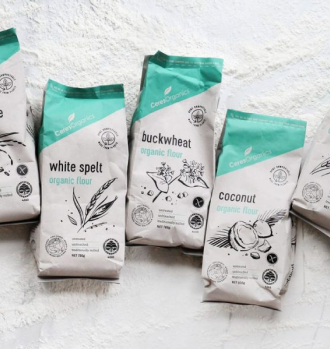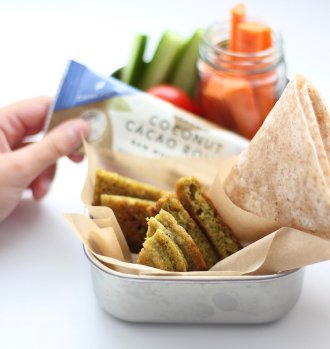supporting our community
meet our growers

Meet Jeong
One of our Seaweed Farmers from Seocheon, Korea.
Jeong loves seaweed as much as we do! Did you know seaweed is a natural carbon reducer and is up to 20x more effective than trees on land in naturally reducing carbon!
read more
Meet Jeong
One of our Seaweed Farmers from Seocheon, Korea.
Jeong loves seaweed as much as we do! Did you know seaweed is a natural carbon reducer and is up to 20x more effective than trees on land in naturally reducing carbon!
read moreMeet Jeong Ho Joo, one of our Seaweed farmers from Seocheon, South Korea.
Why did you get into organics?
Growing up in a Christian family believes in healthy and wholesome food choices, organic food items are always top priority to choose. My parents were involved in seaweed farming, so I learned firsthand about the benefits of incorporating seaweed into my diet. Thanks to their influence, I developed a deep understanding of how important nutritious food choices are for overall well-being.
When I started exporting seasoned seaweed snacks to various countries, I began to realize the benefits of going organic. It resonated deeply with my personal values, the kind of values that I grew up with. So, I made the decision to pursue organic certification for our products.
It was a challenging process that required a lot of time and resources. It took us two years of hard work, but we finally obtained the organic certification. This was just the beginning of our journey into the world of organic food.
What is important to you about organics?
We live by the motto "Health to the world," and we take it seriously. We truly believe that by producing and supplying organic seaweed products, we're doing our part to make the world a healthier place. We make sure our products are free from any harmful chemicals and pesticides by using organic ingredients, and we're committed to sustainable and environmentally-friendly seaweed cultivation practices.
Do you notice any differences with organic?
There may be many differences between organic and non-organic seaweed, but the most important one is whether the moss attached to the seaweed is removed naturally by sunlight and wind, or removed with chemical agents. Removing moss naturally using sunlight and wind requires time and effort. Organic seaweed is a healthy food that is grown using such natural methods, taking time and effort to cultivate.
Are there outcomes of your involvement in organics, such as supporting initiatives to help protect the earth or local communities or anything else that expresses your relationship to organics?
As a producer and seller of organic seasoned seaweed, I initially started with a more business-oriented mindset. I thought this could be a chance to expand this business and increase profits. However, as I met various people in the industry such as other organic product producers, buyers, and distributors from around the world, I discovered a common trait among them. These people were not just doing organic farming as a simple business venture, but they approached this as a mission to ‘restore the earth.’ I came to realize that organic farming is not just about selling food, but it is about selling health to consumers, a clean environment to the earth, and a bright future to future generations.
I once asked one of our organic business partners a question about how they handle the competition. Seeing many other organic brands being sold in the store, I asked if it was difficult for them to compete. The sales representative responded, "They are not my competitors! They are our friends. Our competitors are non-organic brands." Now, our company also aims to approach organic farming not just as a simple business, but as a mission to restore the earth, as friends of other organic brands.
Why did you get into organics?
Even before organic certification existed, we were already producing our seaweed in an environmentally-friendly way. While other seaweed farms were using acid for cultivation, we were able to grow great seaweed without it by harnessing the power of the ocean's waves and currents.
More than a decade ago, we realized that going organic was the way forward for our seaweed farm. Not only will it set us apart from the competition, but it also aligned with our values of protecting the environment and promoting healthy living. Today, organic farming has become a guiding principle of our business.
What sets our seaweed farm apart from others is that we're in charge of every single stage of the process, from cultivating the seaweed, to producing the seedlings, to processing the dried seaweed. This way, we can guarantee a more thorough management throughout the entire process.
We're excited about the continued growth of the organic market and its potential to contribute to a cleaner, healthier world. We will continue to do our best to provide our customers with the highest quality seaweed, grown in environmentally friendly ways.
What is important to you about organics?
The ocean environment is deteriorating and the effects of climate change are becoming more and more severe. That's why it's crucial for us to prioritize organic farming practices to ensure a sustainable future for generations to come. Not only does organic farming help sustain our environment, but it also brings a lot of health benefits. We're hoping that more people will choose to consume our organic products and benefit from the ocean's nutrients.
Do you notice any differences with organic?
You may not be able to tell the difference between organic and non-organic seaweed just by looking at it, but there are important reasons why we choose to grow our seaweed organically. Organic seaweed is grown without the use of chemical methods, preserving its natural nutrients. To make sure our seaweed is of the highest quality, we expose it to plenty of sunlight. Although this takes more labor and may result in lower yield, but we believe it's worth it to produce healthy and nourishing food products.
Any final words?
Seaweed has now become a popular food worldwide and it's only going to become more popular in the future. Consumers will seek it as a snack or a side dish. That's why I believe that providing organic seaweed to this expanding market will have a positive impact on both the environment and people's well-being.
When my father handed over the family business to me, I was eager to introduce organic farming. But in the beginning, it wasn't easy to convince everyone. Organic farming was still new, and the demand for seaweed wasn't as high as it is today. Despite these challenges, I was determined to pursue organic certification and make a difference in the market. It was a tough process, but now, our company is recognized as a leading supplier of organic raw seaweed. Looking back, I think it was a wise decision.















